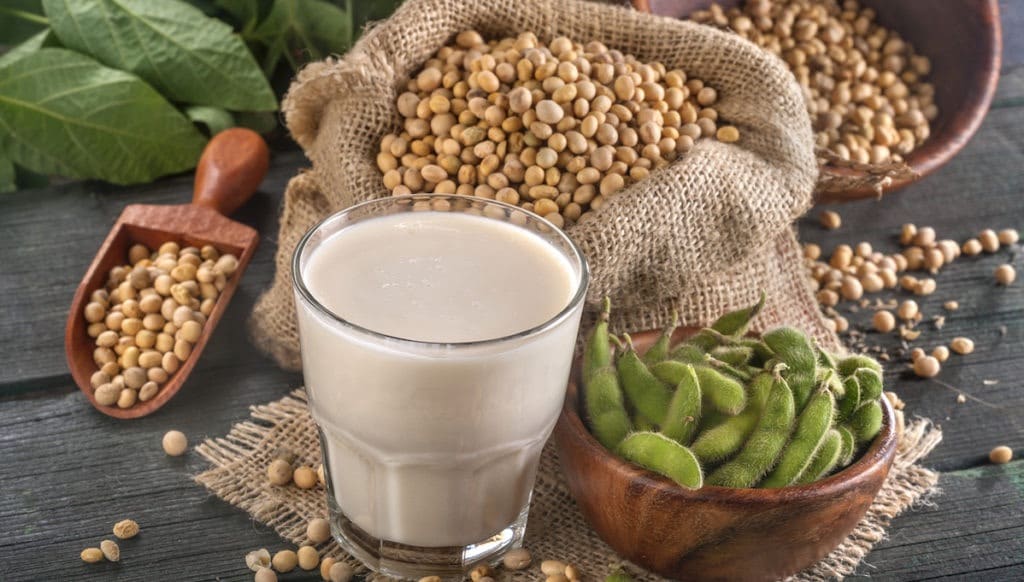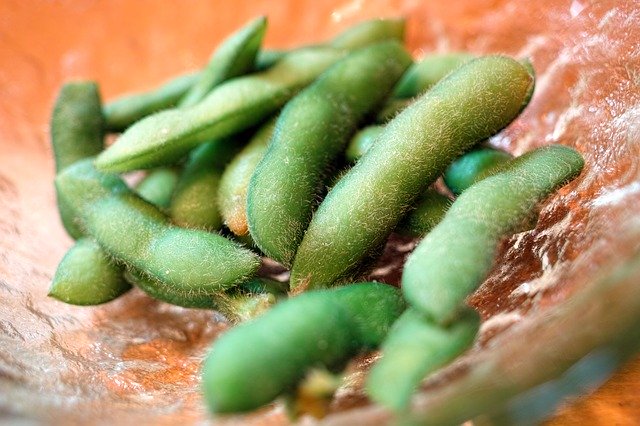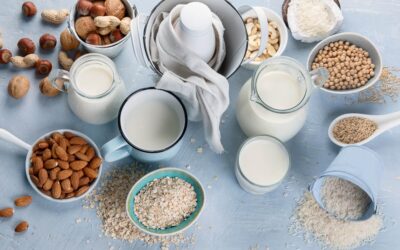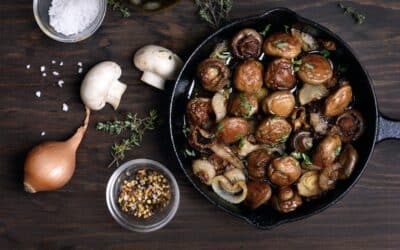Women’s Health and Hormones
It’s no secret that women run this world. Especially healthy, strong, energized women who are fueled by soy. Despite the bounty of misinformation out there, soy products like tofu, tempeh, soy milk, and edamame are incredibly beneficial for most people, and especially women. We’re addressing some of the big myths we’ve heard circulating about soy and women’s health, while debunking them with evidence. Soy shouldn’t be feared when its powerful compounds can vastly improve health in multiple ways. Instead, soy should be intentionally incorporated into a balanced diet to reap the many benefits. So grab your mother, sister, friend, etc, and enjoy a tofu taco, tempeh sandwich, or soy latte together- your health will thank you.

Soy milk, edamame, and other soy products provide benefits, especially for women’s health.
Myth #1: Soy feeds breast cancer.
According to the American Cancer Society, 1 in 8 American women get breast cancer (1). They note that what we choose to eat (and what we choose to avoid) affects this risk, and recommend putting more plants, and fewer animal foods on our plates (2). They specifically mention that “soy foods such as tofu may lower the risk of cancers of the breast” (2), which aligns with research on over 600,000 participants, showing that “a high intake of soy foods exhibits a beneficial role in reducing the risk of breast cancer.” (3)
What about dairy? Back in 2018, the American Cancer Society said that the jury was out on how cow’s milk affects breast cancer risk (2), but two years later, a groundbreaking study shed light on the issue. Research including over 50,000 participants revealed that people who drank more cow’s milk, regardless of the milk’s fat content, increased their risk of getting breast cancer by 50%. Replacing cow’s milk with soy milk, on the other hand, dropped their risk by 32% (4). As you can see, it’s extremely unfortunate that many women opt for cow’s milk over soy milk to lower their risk of getting breast cancer.
Some women who already have breast cancer also steer clear of soy milk out of fear that they’d be fanning the flames. Would they continue this practice if they knew that a leading national or global authority disagreed with them? What two highly reputable organizations agreed that soy is safe for breast cancer survivors? Three? The consensus was actually reached by five titans in this space: The American Cancer Society (5,6), the American Institute for Cancer Research (7), the World Cancer Research Fund International (8), and the Canadian Cancer Society (9). They all agree: Soy is safe for breast cancer survivors.
Not only is soy safe, large scale research shows that it’s protective! And the good news is it doesn’t take much to have an effect. A meta-analysis of 23 studies including more than 300,000 people found that adding the equivalent of ½ cup of tofu or a tall glass of soy milk to our daily diet drops the risk of dying from breast cancer by 24% (10). Given that breast cancer is the second leading cause of cancer death in American women, taking 1 in 39 lives (1), it makes sense to do what we can to protect ourselves and stay healthy. Including more soy in our diets is an excellent way to stack the odds in our favor.
Myth #2: Pregnant women should avoid soy, both for their own health, and for their babies too.
The debate over whether pregnant women should eat or avoid soy foods during pregnancy seems to be a particularly contentious topic. Thankfully, dedicated scientists have put years into studying this very issue, and their findings do a great deal to clear up the confusion.
Several recent studies have explored the connection between soy consumption during pregnancy and their risk of gestational diabetes (11), a condition where non-diabetic women develop high blood sugar during pregnancy, increasing the risk of complications for both mother and child (12). It turns out that, compared to pregnant women who eat less soy, those that have more of it dramatically cut their risk (13,14), and end up with less than half the odds of developing gestational diabetes due to better blood sugar control (15). Randomized controlled clinical research also found that, compared to a more animal-based diet, a soy-rich plant-based diet led to healthier blood sugar levels (16), indicating that replacing animal protein with soy may be responsible. Putting it all together, evidence is mounting that soy can support a healthier pregnancy.
It’s also become clear in recent years that, while soy was once rumored to cause birth defects, this myth has been put to rest. Instead, far more robust evidence now demonstrates that pregnant women who consume soy give birth to children with a lower risk of birth defects (11). Recent evidence also suggests that pregnant women who eat and drink more soy give birth to children with a lower risk of hyperactivity disorders and peer problems (17). In other words, soy intake is linked to benefits for both mother and child.

Edamame is an easy and convenient way to enjoy soy.
Myth #3: Soy estrogens wreak hormonal havoc, disrupting menstrual cycles and causing hot flashes.
The idea that soy prevents ovulation is a mere myth. Though not medically concerning, soy consumption can slightly increase menstrual cycle length though, according to a recent review of over 400 reports (18). The paper, published by a team of international researchers, underscored that soy and its bioactive components don’t disrupt our hormones. They pose no problem to our thyroids, and “Adverse effects are also not seen on breast or endometrial tissue or estrogen levels in women, or testosterone or estrogen levels, or sperm or semen parameters in men.”
Not only is there no evidence of hormonal harm, the use of soy and its biologically active components to treat hot flashes has actually been of interest to scientists for 30 years (19). Consuming miniscule amounts of these components doesn’t have much of an effect (20), but it doesn’t take much to experience significant benefits. Nineteen randomized controlled trials, including over a thousand women, found that getting the equivalent of even half a cup of cooked soybeans per day provides enough of these helpful components to significantly reduce both the frequency and severity of hot flashes (21). In fact, a randomized controlled trial of postmenopausal women published last year found that switching to a healthy plant-based diet, including half a cup of daily soybeans, cut their number of hot flashes by 30% and their number of moderate-to-severe hot flashes by 42%, compared to people who continued with their usual diet (22). After three months of eating this way, the majority of women even reported becoming free from moderate-to-severe hot flashes, while none of the women eating their regular diet experienced this tremendous benefit. As a bonus, women who ate a plant-based diet with daily soybeans also improved their quality of life in the psychosocial, physical, and sexual domains, a true testament to the power of soy and other plant foods.
Conclusion
We hope this helps settle any fears about this powerful superfood. Looking for some meal inspiration? Try this quick Mexican Tofu Scramble. Pro tip: this recipe is an easy way to clean out your fridge and use up various veggies – the combinations are endless and sure to taste great!
References →
- American Cancer Society. Key statistics for breast cancer. Accessed on Sept 23, 2022 at https://www.cancer.org/cancer/breast-cancer/about/how-common-is-breast-cancer.html#references.
- American Cancer Society. How your diet may affect your risk of breast cancer. Accessed on September 23, 2022 at https://www.cancer.org/latest-news/how-your-diet-may-affect-your-risk-of-breast-cancer.html.
- Zhao TT, Jin F, Li JG, et al. Dietary isoflavones or isoflavone-rich food intake and breast cancer risk: A meta-analysis of prospective cohort studies. Clin Nutr. 2019;38(1): 136-145.
- Fraser GE, Jaceldo-Siegl K, Orlich M, et al. Dairy, soy, and risk of breast cancer: Those confounded milks. Int J Epidemiol. 2020;49(5): 1526-1537.
- Rock CL, Doyle C, Demark-Wahnefried W, et al. Nutrition and physical activity guidelines for cancer survivors. CA Cancer J Clin. 2012;62(4): 243-274.
- American Institute for Cancer Research. Soy: Intake does not increase risk for breast cancer survivors. 2021. Accessed on September 23, 2022 at https://www.aicr.org/cancer-prevention/food-facts/soy/.
- American Institute for Cancer Research. Soy is safe for breast cancer survivors 2012. Accessed on September 23, 2022 at http://wwwaicrorg/cancer-research-update/november_21_2012/cru-soy-safehtml.
- World Cancer Research Fund International. Continuous update project report: Diet, nutrition, physical activity, and breast cancer survivors. 2014. Accessed on September 23, 2022 at: www.wcrf.org/sites/default/files/Breast-Cancer-Survivors-2014-Report.pdf.
- Canadian Cancer Society. Eating well after breast cancer. 2019. Accessed on September 23, 2022 at: https://www.cancer.ca/en/cancer-information/cancer-type/breast/supportive-care/eating-well-after-breast-cancer/?region=on.
- Nachvak SM, Moradi S, Anjom-Shoae J, et al. Soy, soy isoflavones, and protein intake in relation to mortality from all causes, cancers, and cardiovascular diseases: A systematic review and dose-response meta-analysis of prospective cohort studies. J Acad Nutr Diet. 2019;119(9): 1483-1500.e17.
- Messina M, Duncan A, Messina V, et al. The health effects of soy: A reference guide for health professionals. Front Nutr. 2022;9: 970364.
- Quintanilla Rodriguez BS, Mahdy H. Gestational diabetes. StatPearls. Treasure Island (FL): StatPearls Publishing; 2022 Jan-. Accessed on September 23, 2022 at: https://www.ncbi.nlm.nih.gov/books/NBK545196/
- Pang X, Cai C, Dong H, et al. Soy foods and nuts consumption during early pregnancy are associated with decreased risk of gestational diabetes mellitus: A prospective cohort study. J Matern Fetal Neonatal Med. 2022; 1-9.
- Dong JY, Kimura T, Ikehara S, et al. Soy consumption and incidence of gestational diabetes mellitus: The Japan Environment and Children’s Study. Eur J Nutr. 2021;60(2): 897-904.
- Wang Y, Luo B, Xiang J. The association between soy intake and risk of gestational diabetes mellitus: A prospective cohort study. BMC Pregnancy Childbirth. 2021;21(1): 695.
- Schiattarella A, Lombardo M, Morlando M, et al. The impact of a plant-based diet on gestational diabetes: A review. Antioxidants (Basel). 2021;10(4): 557.
- Miyake Y, Tanaka K, Okubo H, et al. Maternal consumption of soy and isoflavones during pregnancy and risk of childhood behavioural problems: The Kyushu Okinawa Maternal and Child Health Study. Int J Food Sci Nutr. 2021;72(8): 1118-1127.
- Messina M, Mejia SB, Cassidy A, et al. Neither soyfoods nor isoflavones warrant classification as endocrine disruptors: A technical review of the observational and clinical data. Crit Rev Food Sci Nutr. 2022;62(21): 5824-5885.
- Adlercreutz H, Hämäläinen E, Gorbach S, et al. Dietary phyto-oestrogens and the menopause in Japan. Lancet. 1992;339(8803): 1233.
- Lethaby A, Marjoribanks J, Kronenberg F, et al. Phytoestrogens for menopausal vasomotor symptoms. Cochrane Database Syst Rev. 2013;(12): CD001395.
- Taku K, Melby MK, Kronenberg F, et al. Extracted or synthesized soybean isoflavones reduce menopausal hot flash frequency and severity: Systematic review and meta-analysis of randomized controlled trials. Menopause. 2012;19(7): 776-790.
- Barnard ND, Kahleova H, Holtz DN, et al. The Women’s Study for the Alleviation of Vasomotor Symptoms (WAVS): A randomized, controlled trial of a plant-based diet and whole soybeans for postmenopausal women. Menopause. 2021;28(10): 1150-1156.








